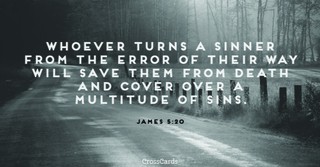
- Recent Translations
- All Translations
James 5:12
Share
Settings
Truthful Speech
12 Now above all, my brothers, do not swear, either by heaven or by earth or with any other oath. Your "yes" must be "yes," and your "no" must be "no," so that you won't fall under judgment.[a]James 5:12 Meaning and Commentary
But above all things, my brethren, swear not
As impatience should not show itself in secret sighs, groans, murmurings, and repinings, so more especially it should not break forth in rash oaths, or in profane swearing; for of such sort of swearing, and of such oaths, is the apostle to be understood; otherwise an oath is very lawful, when taken in the fear and name of God, and made by the living God, and is used for the confirmation of anything of moment, and in order to put an end to strife; God himself, and the Lord Jesus Christ, and angels, and good men, are in Scripture sometimes represented as swearing: and that the apostle is so to be understood, appears from the form of swearing prohibited,
neither by the heaven, neither by the earth, neither by any other
oath;
of the like kind; such as are forbidden, and cautioned, and reasoned against by our Lord, in ( Matthew 5:34 Matthew 5:35 Matthew 5:36 ) to which the apostle manifestly refers; (See Gill on Matthew 5:34), (See Gill on Matthew 5:35), (See Gill on Matthew 5:36).
But let your yea be yea, and your nay, nay;
that is, whenever there is an occasion for affirming, or denying anything, let it be done nakedly, simply, and absolutely, without any form of oath annexed to it; for whatever addition of that kind is made comes from evil, and tends to it, and is evil:
lest ye fall into condemnation;
by the Lord; for either false, or rash, or profane swearing; for he will not suffer it to go unpunished; see ( Exodus 20:7 ) . Some copies read, "lest ye fall into hypocrisy"; or dissimulation, and get into a habit and custom of lying and deceiving, as common swearers do; and so reads the Arabic version.
James 5:12 In-Context
Footnotes 1
- [a] Other mss read fall into hypocrisy
